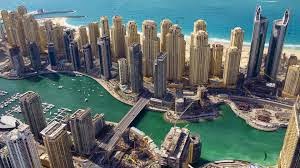The first problem is that Dubai’s on the wrong end of a long slope. That means that dust constantly blows over the city from the desert behind it. The air’s never pleasant to breathe, and there’s a constant haze spoiling the view, such as it is.
The view is mostly man-made. And the theme is simple: build it big. So Dubai is all huge expanses of concrete upwards, and wide stretches of tarmac horizontally. Colossal buildings linked by fast roads with little or nothing done for pedestrians. And constantly humming through it all is a hymn to money. I’ve never seen such a collection of yachts in the harbour, so large, so luxurious, so completely immobile.
 |
| Dubai: where few prospects please but the scent of money's everywhere |
At the top of the hierarchy the tiny number of Dubai citizens, none of whom I ever saw: presumably they move only from air-conditioned mansion to air-conditioned shop by air-conditioned, tinted-window car.
Next are what we casually refer to as Westerners: Americans, Europeans, Japanese.
Behind them come the underprivileged. First the citizens of former Soviet Republics: Russians, Kasakhs, and others from the region. They’re the waiters, the receptionists and the chambermaids. Or, so I’m told “chambermaids.”
And finally the huge army of Pakistanis, Nepalese and other South Asians, who form the queues each morning at the building sites, working for a pittance, in dangerous conditions, with minimal rights.
 |
| Migrant workers in Dubai Exploited, endangered, enjoying few rights |
A colourful figure from that colonial time has been reincarnated today, in a rather reduced version: the remittance man. This was the Black Sheep sent away, usually after some scandal at home, to a distant colony where his small remittance would allow his family and friends to ignore him.
You get quite a lot of that kind of character out in Dubai these days. Disreputable, slightly fly-blown, always looking for the scheme that’s going to make them rich. And some of them, suprisingly, manage.
I met one of them out there. Sam (that wasn’t his name and, as far as I know, it still isn’t) had been Chief Executive of a company he’d founded with a group of colleagues. They’d had an innovative idea in software development, and got a system out to market fast, giving them several years of impressive success. Sadly, however, when small companies find a clever notion, the big boys won’t be far behind. They have the resources to put huge teams onto them, and eventually turn out something more powerful, more effective and easier to support. Suddenly, the small company’s playing catch up.
What it needs is another smart idea, to get some edge over the big players again. But good ideas aren’t that common or simple to come up with. And Sam’s company didn’t.
His reaction was quite a common one: under pressure, he would disappear. He’d turn off his mobile and clear off somewhere that nobody could find him. Leaving his colleagues in disarray.
Eventually, they got tired of him and pushed him out of the Chief Executive position. But they didn’t sack him – indeed they left him with a massive salary and, of course, his shares.
Things continued to get worse, and he kept on disappearing. But, freed of even the responsibilities he ignored as Chief Exec, he’d disappear a lot further. He started heading off regularly to the Gulf. There he could enjoy the pink gin existence, with few questions asked, of the remittance man. All he had to do was attend a few meetings out there and report home about how good the prospects were.
That left him convinced that he was an important contributor to his company. I once had the privilege of working with another former Chief Executive like him: he once assured me “I feel I’m working at all times, whenever I’m thinking about the company.”
“So,” I asked him, “as long as you think about the company, you’re working even if you’re lying in the bath?”
Sadly, he explained to me that this was exactly how he saw things.
The beauty for Sam was that he could be out in the Gulf whenever things got tough at home. Eventually, his colleagues sold the company and even got a reasonable deal for it. Inevitably, in time, the new owners decided it was time for a new broom. Many of the old guard, the people who’d built the company and its products, were sacked.
But not Sam. He’d persuaded the owners that the Gulf was the place. The new Eldorado, the land adventurers from Europe sought to bring gold home. The Gulf was the place that could provide gold today, for a company that knew how to play its cards. Sam had persuaded the new owners that he was the man to play the cards. And he was out of the country when the axe fell on his colleagues.
How much gold has he brought home? I saw Sam out there six years ago. At that stage, after two years in the region, he had nothing but glittering promises. To my knowledge, today, after eight years, he’s still produced nothing.
Except for a good salary for himself. On top of the seven-figure sum he had for his shares.
It’s wonderful to see the old traditions being maintained. Fortune favours the guy who knows how to be out of the way at the right time, bluff the people in power, and sell snake oil at a high price.
Leaves you with a lovely warm feeling, doesn’t it?
No comments:
Post a Comment